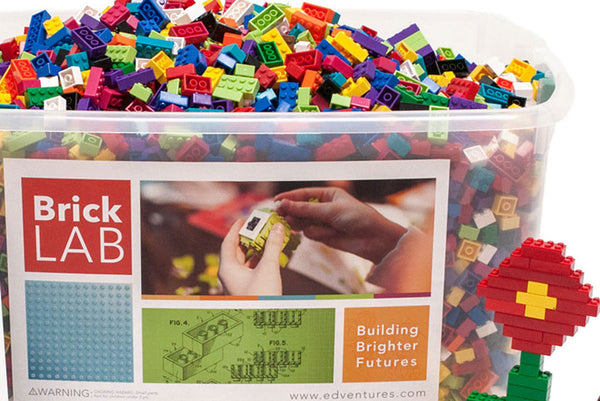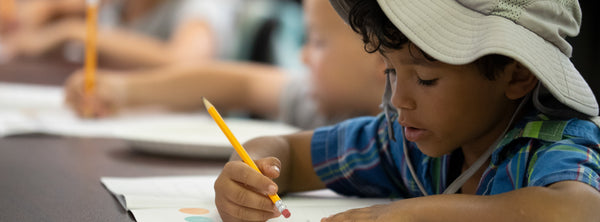
Building with BrickLAB Makes Learning Fun
What is BrickLAB?
BrickLAB is a gateway into spectacular STEMventures! As a learning solution capable of invigorating any educational environment, BrickLAB is manipulative-based learning at its finest. Comprised of plastic blocks that combine and interlock paired with curriculum and educator resources, these sets empower students ages 5 to 95 to build anything they can imagine.

BrickLAB Bricks have been used in classrooms and makerspaces for nearly 15 years, offering opportunities for hands-on learning and student-driven exploration in all grade levels. A standard BrickLAB includes 6,500+ of PCS Edventures’ signature “Perfect Bricks.” These bricks are developed with superior grip strength and rounded edges for solid creations that won’t fall apart easily and don’t hurt hands during deconstruction. These bricks have been tested and proven in classrooms around the globe.
Plus, there are extensive curriculum options available to complement any BrickLAB set. BrickLAB is here to bring STEM to your learners in exciting ways that build student buy-in and lifelong interest!
The Power of Kinesthetic Learning
Hands-on learning engages both students’ minds and their hands. Also known as kinesthetic or tactile learning, it is a style in which students perform physical activities or manipulate materials rather than listening to a lecture or reading information. Kinesthetic, manipulative-based, or hands-on — no matter what you call it, this learning stimulates multiple senses and often helps students better remember concepts.
“Hands-on learning engages students’ minds and hands.”
After studying “effective implementation of STEM,” John Kyere (2017) of Walden University found:
Hands-on [teaching methodology] has the potential to make students active learners, promote a higher level of participation and motivation, to increase students’ interest and understanding, to lead, to the construction of knowledge by the students themselves, and to bring greater retention of program material to increase performance. (p. 108)
In addition, he discovered that hands-on learning is especially effective in the teaching of science and math topics. Traditional teaching styles, such as lectures and textbook readings, can help provide background information, but getting to touch real objects creates more comprehensive learning. Not only that, but students become more curious and engaged when they have the option to dive into the subject through a hands-on approach. This leads to greater classroom success overall.

To prove this point and better understand the connection between hands-on teaching and student success, Boise State University and the Idaho SySTEMic Solution (ISS) conducted a joint three-year study called “Connecting Science with Engineering: Using Inquiry and Design in a Teacher Professional Development Course.” The researchers showed that manipulative-based learning with BrickLAB increases enjoyment of both STEM learning for students and STEM teaching for educators.
When students are given opportunities to use their hands along with their minds, they learn far more than lesson content alone. They practice motor skills and spatial awareness, learn math and numeracy skills, and pay attention for longer spans (Nadelson, Pyke, Callahan, Hay & Pfiester, 2011). Plus, 21st century skills integrate naturally, especially the 4 C’s: communication, collaboration, critical thinking and creativity.
Beyond student learning, bricks can increase teachers’ confidence in STEM subjects. In Solving the STEM Stigma, Casper describes results from the same study regarding the advancement of elementary teachers’ abilities to effectively convey STEM topics in their classrooms. He states, “Through a three-day workshop and simple interaction with BrickLAB manipulatives, the researchers were able to increase efficacy and confidence for teaching STEM, as well as improve the participant’s previous notions of engineering” (p. 7).
Teachers who enjoy and understand what they are teaching are able to communicate clearly and positively with their students. This creates a better experience for everyone and may even inspire students to pursue future STEM studies or careers. See the STEM Stigma White Paper for the full report.
Classic BrickLAB Sets
When students build and create, they gain a fuller understanding of the presented concepts. This applies not only in engineering and math, but also in history, language arts, design and more. These BrickLAB collections help educators apply bricks in a variety of learning environments:
- BrickLAB Core is designed to address the traditional classroom core topics of math, language arts, social studies and science. Students engage in project-based learning activities, building brick models to explore habitats, spatial relationships, map building, storytelling and more. You can choose a single curriculum for your grade level (between 1 and 6) or get them all with the Ultimate Set.
- BrickLAB Tech focuses on engineering and tech. It challenges learners to get creative as they innovate and manipulate with various technologies, simultaneously discovering its applications in society.
- BrickLAB STEM Foundations is broken into four subject areas. First, students take a look at Engineering. In this segment, students act as architects, exploring engineering principles and studying great monuments throughout history including the Egyptian pyramids and Greek temples. Next comes Math. Here students discover geometry and statistics, then apply the new knowledge to cubes, pi, tessellations, measurement and more. In the Communication unit, students use precision and technology to convey ideas with semaphore and Braille systems. Finally, students experiment with force and motion in the Physics curriculum.
- BrickLAB Zoo (Grades 1-3) - Traverse tricky terrain, shake claws with lobsters and design ecosystems in this life science camp! Exploring the globe, learners discover the diversity of wildlife adaptations, the differences in habitats and what’s necessary for each biome’s survival. With a learn-by-doing approach, students build models of each animal, focusing on what makes them special. BrickLAB Zoo delivers an engaging, hands-on experience around the Earth’s biospheres and the vital roles animals play in them.
- BrickLAB Brain Builders (Grades 1-3) - Let’s build better brains! Using bricks to enhance learning, this camp focuses on communication and teamwork as students tackle exercises in social studies, geography, history and biology, all while constructing, collaborating and learning together. Engage in stimulating science and engineering challenges as learners determine patterns, construct unique BrickLAB designs and translate abstract ideas into concrete models! From structures to puzzles, BrickLAB Brain Builders is a sure-fire way to introduce fun and interactive learning into any setting.
- BrickLAB Magic Beans (Grades 1-3) - In BrickLAB Magic Beans, exotic, far-away lands, magical powers and the eternal theme of good versus evil come to life in thrilling engineering, language arts and collaborative communication challenges. Inside the world of princesses and wizards, students boost fluency, vocabulary and comprehension as they act out different folktales. Learners engage in hands-on activities, working together to build the characters and stage props needed throughout camp. Let fiction fly in BrickLAB Magic Beans!
- Pirate Camp (Grades 1-3) - From land-lubber to swash-buckler, it’s the pirate’s life for me! Cast-off into the seven seas and engage in STEM-focused experiments, hands-on design trials and thrilling group discussions. Set the scene each day with suspenseful stories that stimulate curiosity and critical thinking skills. Then, have your merry-bunch of misfits work together to accomplish challenging tasks like forging catapults, tying knots and fashioning maps to hidden treasure! In Pirate Camp, action, adventure and discovery await you at every turn!
- BrickLAB Genetics (Grades 6-8) - With BrickLAB bricks in hand, examine the fascinating world of genetics and heredity! Each day, learners build models to tour the concepts of heredity, construct strands of DNA and review the basics of human inheritance. Through 12 hands-on activities, watch as the complex coding of genes and the impacts of DNA mutations come to life. With BrickLAB Genetics, students assemble a comprehensive view of the unique and distinct processes that make up the world around them!
- BrickLAB Famous Architecture Around the World (Grades 4-6) - Travel the globe learning how ancient architectural breakthroughs led to the fundamental design elements we know today. From walls and arches to post-and-lintel building techniques, construct and inspect how similar configurations evolved at the same time in different cultures around the globe. Discover and replicate some of the most famous designs in history, all while learning how different societies made their stylistic, artful and structural considerations of construction and architecture.
Enrichment Programs
Another great BrickLAB option is Enrichment Programs. These programs are specialized for after-school and summer programming. Unlike classic BrickLAB sets, Enrichment Programs include color copies of student print materials and all extra materials needed for the lessons including storybooks, pencils, paper and more. These materials are different for each camp, specialized based on a unique and exciting theme, encouraging students to explore real-world applications of STEM concepts:
Why Choose BrickLAB?
For more than 30 years, PCS Edventures has specialized in the kind of application-based, iterative discovery that characterizes an engineering design approach to problem-solving. BrickLAB is a tried and true learning tool that can bring new life to any lesson. When students are given the opportunity to try, fail, and try again, they develop grit. They learn that failure is not the end — it’s a learning experience. An opportunity to correct initial failings to make an even better creation.
As the 20th-century education influencer, John Dewey, once said, “Failure is instructive. The person who really thinks learns quite as much from his failures as from his successes.” This process of learning-by-doing leads to critical thinking, problem-solving skills, innovation and intrinsic motivation, all of which will support long-term student success.
“Failure is not the end — it’s a learning experience.”
BrickLAB is one thrilling way to start students on the path to becoming builders, innovators and makers. Educators around the world are achieving incredible success by introducing bricks to their students. Set down the textbooks and put engaging STEM materials in your learner’s hands, helping them retain more information, stay engaged longer and build critical skills needed to excel in STEM fields. Time to start building!
To learn more about how BrickLAB, or PCS Edventures’ other product lines: Enrichment Programs and Discover, innovate education and build student STEAM identities, check out the webinar:
Interested in how Enrichment Programs can invigorate your learning environment? Download a free Curriculum Sample, peek behind the scenes at PCS Edventures or contact a STEM Program Specialist at (800) 429-3110 or sales@edventures.com for more information.








